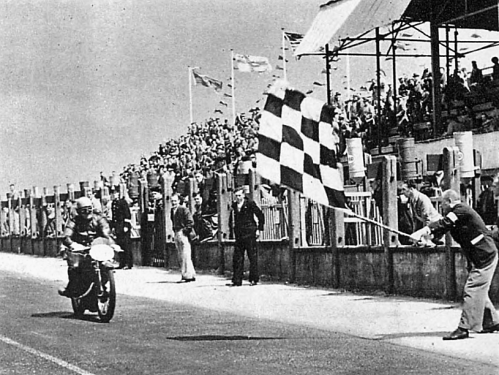In motorsports, the phrase to take the checkered flag (British English to take the chequered flag) means to win a race.
This phrase refers to checkered flag (British English chequered flag), denoting a flag with a black-and-white checkered pattern, displayed to drivers at the end of a race—as mentioned for example in the following from The Boston Herald (Boston, Massachusetts, USA) of Sunday 5th September 1909, about “the big automobile race carnival” that was to take place at Lowell, Massachusetts:
Rules for Contestants.
The rules for contestants were given to the various racers this afternoon by F. B. Hower. […]
[…]
9—Red flag means everything all right.
10—White flag means danger. Exercise great caution.
11—Green flag given at the start and finish line means one more lap for you.
12—Black and white checkered flag given at the start and finish line means race finished for you.
[…]
18—Immediately after receiving the black and white checkered finish flag continue on the course about 700 yards distant, where you will find another black and white checkered flag. There you will place your car in charge of the technical committee for weighing out and final examination.
From an article about the Isle of man Tourist Trophy races, published The Illustrated Sporting and Dramatic News (London, England) of Friday 23rd June 1939, the following photograph was captioned “Chequered flag for the winner”:

However, the texts containing the earliest occurrences that I have found of to take the checkered flag indicate that the phrase originally meant to finish a race, not to win a race.
The first of those texts is an article published in several U.S. newspapers on Sunday 20th April 1919—for example in The Evening Star (Washington, D.C., USA):
Dario Resta, owner of the only championship medal in the history of American automobile racing, will defend his right to the title won in 1916 in the 500-mile liberty sweepstakes at Indianapolis May 31.
Resta is a driver who is possessed of great mechanical ability and is also a shrewd driver. It is noticeable that he either wins or does not finish the race. In the fifteen races that figured in the 1916 championship Resta finished first in five and gained 4,100 points. While he did not start in all of the fifteen title events, he never took the checkered flag after it had been waved for an opponent.
Likewise, in the following from the Daily Ardmoreite (Ardmore, Oklahoma, USA) of Thursday 22nd May 1919, it is because to take the checkered flag means to finish a race that to take the checkered flag a winner means to win a race:
Glenn Breed, driving his Hudson super-six, took first money at the automobile races held at Durant yesterday afternoon. Leo Rice, driving the white Dodge, was a close second and hot after the Hudson in every race.
[…]
Glenn Breed, Hudson; Ray Rice, Chalmers; Leo Rice, Dodge; […] lined up for event No. 4 which was five mile non-stock free for all. […] Breed took the checkered flag a winner with time six minutes and 43 seconds. Rice in the Chalmers came in second with time seven minutes and 10 seconds. Leo Rice in the Dodge gave out of gas in the fifth lap and was out of the race.
The earliest occurrences that I have found of the phrase to take the checkered flag meaning to win a race are from the San Francisco Chronicle (San Francisco, California, USA):
– Of Sunday 6th May 1923:
Battalion Chief Thomas J. Murphy of the San Francisco Fire Department was on hand at Fresno to see his nephew, James Anthony, annex first honors.
Battalion Chief Murphy is an ardent automobile racing fan, and whenever he has the opportunity he goes to Los Angeles to the 250-mile grinds there.
He says he had no doubts in his mind that Jimmy would take the checkered flag a week ago Thursday, even before the race started, as he knows just how Jim drives and how he outgenerals the rest of the pack.
– Of Sunday 27th May 1923:
Indianapolis Speedway, May 26.—Everything is now in readiness for the twelfth annual Indianapolis 500-mile international sweepstake, America’s blue ribbon automobile classic. […]
[…]
While no former winner has ever been able to repeat, the majority of the favorites this time have taken the checkered flag. For instance, both Tommy Milton and “Howdy” Wilcox were victors in 1921 and 1919, respectively.
